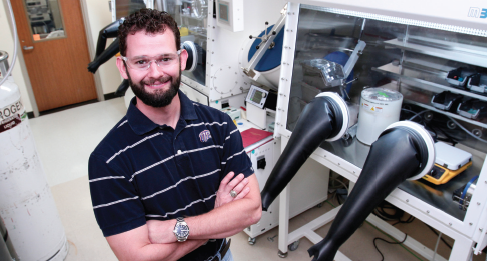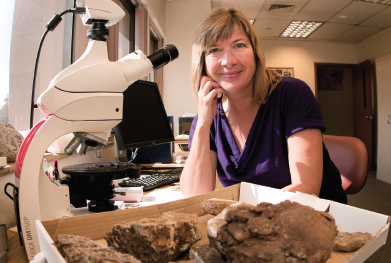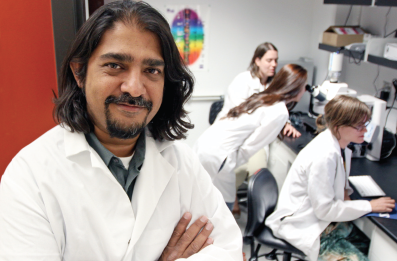Three new faculty members in UTEP’s College of Science bring impressive educational backgrounds, groundbreaking research projects, and a burst of energy to the University. From using geology to find oil, to developing solar fuels and solar water purification systems, to studying how the brain controls food intake and responds to blood sugar levels, these researchers provide a new dimension of expertise at UTEP.
Michael Irwin, Ph.D.
What is your position
at UTEP?
I am an assistant professor of chemistry and materials science and engineering.
What is your educational background?
I earned my B.A. from Texas A&M University in chemistry and my Ph.D. from Northwestern University in inorganic chemistry.
What is your research background and what are your current research projects? 
My background is in inorganic and materials chemistry. My current research is based on sustainability science with focuses on organic photovoltaics, dye-sensitized solar cells, solar fuels, and solar water purification.
Why did you choose your career?
After researching a few different professions, I decided that I wanted to have a career like my role model and undergraduate adviser, Professor John Fackler.
Why did you choose UTEP?
I was offered a postdoctoral position under the Intelligence Community Postdoctoral Fellowship program within the W.M. Keck Center for 3-D Innovation. The opportunity seemed too good to pass up and has worked out beautifully for me. As this position was coming to a close, Professor Luis Echegoyen and I started a collaboration that seemed too good to be true. After some negotiation, I elected to stay at UTEP to pursue my passion. The professionalism, poise and vision of Dr. Natalicio, as well as the opportunity for continued collaboration with the Keck Center and MRTI (Materials Research and Technology Institute), also played big roles in my decision to remain at UTEP.
What is your favorite part of your job?
I really enjoy the problem solving aspect of my job. In addition, I like that I get to help create new scientists and engineers and therefore have a hand in the future of science.
Kate Giles,
What is your position
at UTEP?
I am a faculty member in the Department of Geological Sciences. I hold the Lloyd A. Nelson Professorship and am the Director of the Institute of Tectonic Studies at UTEP.
What is your educational background? 
I have a B.S. degree from the University of Wisconsin-Madison; an M.S. degree from the University of Iowa; and a Ph.D. from the University of Arizona.
What is your research background and what are your current research projects?
My research is primarily in the study of carbonate rocks (limestone) and their relationship to tectonic processes. I am especially interested in understanding the controls on the development of fossil reefs. Some of these reefs are more than 600 million years old and were constructed by creatures long extinct. I am currently focusing on understanding how salt diapirs rise and flow by documenting how sediments are deposited and deformed around diapirs – especially reefs. My students and I are studying outcropping diapirs in Utah, Spain, and South Australia at the moment.
What is a diapir, and why are they important?
A salt diapir is a vertically or subhorizontally rising column of salt that stems from an originally horizontal sedimentary layer of salt. Sediments pile up around the rising salt diapir. Some of the sediments deposited next to the diapirs form a zone where oil and gas collects in what is referred to as a trap. Oil companies are actively exploring for salt diapir related traps, especially in the Gulf of Mexico. My research provides models that aid in the prediction of where those traps might be.
Why did you choose your career?
I have always been fascinated by nature and particularly enjoy trying to understand the evolution of the Earth. I had worked as a research geologist for Exxon for several years after graduating from the University of Arizona. I quickly decided that I wanted to follow my own research interests. I also like to share my knowledge with others. As a faculty member at a major research institution, I can achieve both of these goals.
What is your favorite part of your job?
I enjoy travelling with students and fellow researchers to remote areas around the world to study rocks. It’s the ultimate research laboratory for someone like me who loves to be outdoors observing nature along with people who like to do the same.
Arshad Khan, Ph.D.
What is your position at UTEP?
Assistant professor in the Department of Biology
What is your educational background?
I earned my Ph.D., from the University of California – Riverside and I completed my postdoctoral work at the University of Southern California.
What is your research background and what are your current research projects?
My dissertation at the University of California – Riverside focused on how the brain controls food intake and helps regulate body weight. I centered on the molecular machinery in a brain region called the hypothalamus and how it controls food intake. I had a great deal of  neuroanatomical training during my postdoctoral years with Alan Watts at the University of Southern California, which in turn changed my focus to the neuroanatomy of the hypothalamus. I was interested mostly in how the brain responds to the stress of having low blood sugar. After earning a Career Development Award (K01) from the National Institutes of Health in 2008, I have developed and brought with me to UTEP two research agendas that are interrelated. I’m interested in the brain circuits that control food intake and those that are involved in blood sugar regulation.
neuroanatomical training during my postdoctoral years with Alan Watts at the University of Southern California, which in turn changed my focus to the neuroanatomy of the hypothalamus. I was interested mostly in how the brain responds to the stress of having low blood sugar. After earning a Career Development Award (K01) from the National Institutes of Health in 2008, I have developed and brought with me to UTEP two research agendas that are interrelated. I’m interested in the brain circuits that control food intake and those that are involved in blood sugar regulation.
Why did you choose your career?
I was always curious about science when I was a child and decided to embark on a pre-medical track during my undergraduate years at the University of California – Riverside. As a senior, I began leveraging time in the lab doing research for entrance into medical school. After some time, I realized I was more enamored with the research itself. I looked for the appropriate avenue to utilize my interests in research and the skills I acquired and decided to get my Ph.D. instead of going to medical school.
Why did you choose UTEP?
I chose UTEP for a number of reasons. First, the mission of both the University — access and excellence – and the Border Biomedical Research Center (BBRC) – border health issues, including diabetes and obesity – were very appealing. There is a dynamism in the faculty and students on campus that shows this undercurrent of access and excellence in an astonishing way. The competitively modern facilities suggested that a lot could be accomplished with the support I would receive. I was challenged positively by the idea of finding a sense of how my research overlaps with others in a very collaborative and interdisciplinary way. Lastly, Rob Kirken, the department chair of biology and BBRC program director, is visionary about recruiting high-caliber faculty from multiple disciplines.